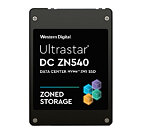Tuesday, June 8th 2021

Western Digital, Percona Join Forces to Extend The Zoned Storage Ecosystem
Championing the Zoned Storage initiative, Western Digital Corp. (NASDAQ: WDC) today announced at its Flash Perspective Event that it has teamed with Percona, a leader in open source database software and services, to unlock the performance benefits of Western Digital's Ultrastar DC ZN540 NVMe ZNS SSDs for MySQL Server, one of the most popular open-source transactional databases in the world.
"Many of our customers are using MySQL as a database for their online data services and this new partnership with Percona will allow customers to unlock the full capabilities of our innovative ZNS flash solutions. With our contributions to the Linux and MySQL open-source communities, MySQL users will be able to install the Percona Server for MySQL and get out-of-the-box support for Western Digital Zoned Namespaces SSDs," said Wim De Wispelaere, vice president, Strategic Initiatives at Western Digital. "This demonstrates our continued commitment to deliver innovative data center infrastructure products and to build our partnership ecosystem to make those easy to implement by our customers.""We have an ongoing mission to help our customers improve their open-source database performance, as this supports the critical applications that those companies run. We are excited to form this technology alliance with Western Digital to bring our open-source database expertise to customers. This alliance will allow customers to capitalize on the distinct skillsets of Percona and Western Digital, enabling customers to keep pace with modern application performance demands and ensure they can monitor performance with ease," said Peter Zaitsev, founder and CEO at Percona.
To more efficiently meet the next wave in application growth, today's modern databases must run on NVMe SSDs to meet the performance requirements of cloud-scale e-commerce, IoT and other services as user experiences depend on it. Western Digital tests indicate that a MySQL Server running on a ZN540 ZNS SSD with MyRocks can perform up to 3x more transactions per second compared to using a conventional SSD with InnoDB in write-heavy MySQL use cases. These transactions complete with shorter and more predictable latency, making the cloud services more responsive.
The Ultrastar Zoned Namespaces SSD also delivers up to 25 percent higher density and can endure 3.5 drive writes a day, making it more robust in highly transactional workloads.
As part of the technology alliance with Western Digital, Percona will provide enterprise-class software support, performance-tuning and consulting services for the use of Percona Server for MySQL with Western Digital ZNS SSDs. Together the companies will ensure that customers with mission-critical environments can get access to expertise around the clock.
The Percona Server for MySQL with Western Digital ZNS SSDs will be available in the second half of calendar year 2021.
For more information, visit this page (PDF).
"Many of our customers are using MySQL as a database for their online data services and this new partnership with Percona will allow customers to unlock the full capabilities of our innovative ZNS flash solutions. With our contributions to the Linux and MySQL open-source communities, MySQL users will be able to install the Percona Server for MySQL and get out-of-the-box support for Western Digital Zoned Namespaces SSDs," said Wim De Wispelaere, vice president, Strategic Initiatives at Western Digital. "This demonstrates our continued commitment to deliver innovative data center infrastructure products and to build our partnership ecosystem to make those easy to implement by our customers.""We have an ongoing mission to help our customers improve their open-source database performance, as this supports the critical applications that those companies run. We are excited to form this technology alliance with Western Digital to bring our open-source database expertise to customers. This alliance will allow customers to capitalize on the distinct skillsets of Percona and Western Digital, enabling customers to keep pace with modern application performance demands and ensure they can monitor performance with ease," said Peter Zaitsev, founder and CEO at Percona.
To more efficiently meet the next wave in application growth, today's modern databases must run on NVMe SSDs to meet the performance requirements of cloud-scale e-commerce, IoT and other services as user experiences depend on it. Western Digital tests indicate that a MySQL Server running on a ZN540 ZNS SSD with MyRocks can perform up to 3x more transactions per second compared to using a conventional SSD with InnoDB in write-heavy MySQL use cases. These transactions complete with shorter and more predictable latency, making the cloud services more responsive.
The Ultrastar Zoned Namespaces SSD also delivers up to 25 percent higher density and can endure 3.5 drive writes a day, making it more robust in highly transactional workloads.
As part of the technology alliance with Western Digital, Percona will provide enterprise-class software support, performance-tuning and consulting services for the use of Percona Server for MySQL with Western Digital ZNS SSDs. Together the companies will ensure that customers with mission-critical environments can get access to expertise around the clock.
The Percona Server for MySQL with Western Digital ZNS SSDs will be available in the second half of calendar year 2021.
For more information, visit this page (PDF).

1 Comment on Western Digital, Percona Join Forces to Extend The Zoned Storage Ecosystem
Zoned Namespaces is an extension to the NVMe protocol that exposes how the SSD stores and organizes the data internally, bypassing the Flash Translation Layer in conventional SSDs.
This basically means the controller is bypassed, and the OS sees the flash chips individually and can talk to them directly. Effectively taking the SSD controller out of the equation and moving those responsibilities to software. I am a huge fan of this approach because it will bring down the price of SSDs (no more controller), make the controller open source (if running on Linux), and specific scenarios can be optimized for by software developers